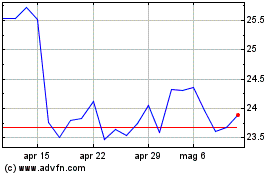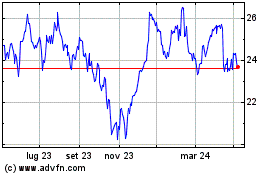By William Mauldin
WASHINGTON -- American steel-making is on a roll -- and so are
its hired guns in the nation's capital.
Lobbying by steel producers, including some foreign firms,
jumped last year to $12.2 million, up 20% from 2017 and the highest
in at least two decades, according to the Center for Responsive
Politics.
Major steel companies pushed the Trump administration to impose
tariffs under Section 232 of U.S. trade law, leading to higher
prices in the U.S., higher profits and plans to expand capacity.
For example, U.S. Steel Corp. said Monday that it plans to resume
construction of a new furnace in Alabama.
Tom Gibson, president of the American Iron and Steel Institute,
the industry's main trade group, said tariffs and subsequent quotas
on imports have helped the U.S. steel industry rebound, but that
those gains could evaporate if tariffs are lifted too soon.
"Our job is to keep making our case on this," he said of the
industry's lobbying efforts.
Nucor Corp. had the highest lobbying spending among steel
producers last year, at $2.23 million, including $730,000 paid to
Washington law firm Wiley Rein LLP.
Public records show Nucor lobbied last year in connection with
President Trump's nomination of two trade officials with ties to
the steel industry: Commerce Undersecretary Gilbert Kaplan and
Jeffrey Gerrish, a deputy to U.S. trade representative Robert
Lighthizer.
Both men were confirmed, joining a roster of high-ranking
officials in the Trump administration with industry ties.
Mr. Lighthizer, the U.S. trade representative, worked for years
as an outside trade lawyer for U.S. Steel, and general counsel of
his office, Stephen Vaughn, lobbied on trade laws for U.S.
Steel.
Wilbur Ross was on the board of Luxembourg-based ArcelorMittal,
the world's largest steel producer, which has mills in the U.S.,
until his confirmation as Commerce secretary in 2017. After his
appointment, he led the administration's steel probe that ended in
tariffs.
"Drawing so many senior government officials from one side of
the equation raises concerns," said Richard Chriss, a former U.S.
trade official who is president of the American Institute for
International Steel, which represents some foreign producers and is
suing to overturn the steel and aluminum tariffs.
Mr. Ross said in a statement that "President Trump imposed
tariffs to prevent imported steel from threatening our own domestic
industry that is critical to our national security."
Steel executives also have contributed to Mr. Trump, with Nucor
Chief Executive John Ferriola giving $25,000 to the Trump Victory,
a joint fundraising committee, weeks after the steel tariffs were
implemented.
A spokeswoman for Nucor, which is based in Charlotte, N.C.,
didn't respond to a request for comment.
The effectiveness of the steel lobby has led to counter efforts
by manufacturers who rely on steel, who say tariffs are raising
their costs and forcing them to pass them on to consumers.
Last month, more than 40 industry groups, including auto
suppliers, wrote to Messrs. Ross and Lighthizer to ask for the
removal of import duties on steel and aluminum from Canada and
Mexico.
And U.S. senators from Mr. Trump's own party have reintroduced
legislation in recent weeks to rein in presidential powers on such
tariffs.
Opponents of the steel tariffs are looking for leverage as the
White House seeks congressional ratification of a modified version
of the North American Free Trade Agreement -- even as it continues
to levy 25% duties on steel from Mexico and Canada, citing national
security grounds.
Tariffs on Canada are opposed even by lawmakers who have
defended the steel tariffs on imports from China and other
countries, as well as by the United Steelworkers Union, which has
members on both sides of the border.
"If there are policy advisers around the president that are
saying this is great for his base, we would vastly disagree," said
Rufus Yerxa, president of the National Foreign Trade Council.
Mr. Lighthizer has signaled he will remove the tariffs on U.S.
neighbors but so far hasn't struck a deal to do so.
Domestic steel producers warn it is too early to remove the
tariffs, with the industry operating only at about 80% of its
capacity, a level identified by the Trump administration as
essential to avoid deterioration but not enough to rebuild.
Some industry executives worry that the steel tariffs likely
won't last forever, with some companies facing potential hardship
when low-priced imports return at higher levels.
"This is an existential battle, and everybody's got to get on
the same page and minimize the damage to all industries," said Dan
DiMicco, the former Nucor CEO who helped the Trump campaign develop
tariff plans during the 2016 presidential campaign.
Mr. Trump is hoping that his support for steel and other
industries translates into political backing in the 2020 election
campaign, advisers and political observers say. The administration
has repeatedly highlighted that U.S. Steel's unionized workers
negotiated a raise last year and that the company reopened
long-idled blast furnaces in Granite City, Ill.
Rep. Mike Bost, the Illinois Republican whose district includes
U.S. Steel's Granite City operation, says the background of Mr.
Trump's advisers is a "real advantage."
Write to William Mauldin at william.mauldin@wsj.com
(END) Dow Jones Newswires
February 12, 2019 11:27 ET (16:27 GMT)
Copyright (c) 2019 Dow Jones & Company, Inc.
Grafico Azioni ArcelorMittal (EU:MT)
Storico
Da Mar 2024 a Apr 2024

Grafico Azioni ArcelorMittal (EU:MT)
Storico
Da Apr 2023 a Apr 2024
